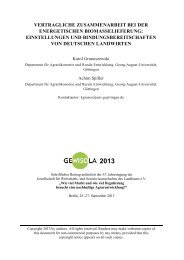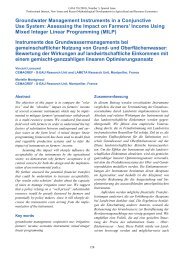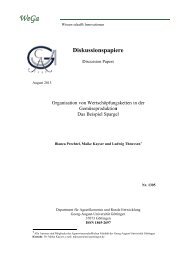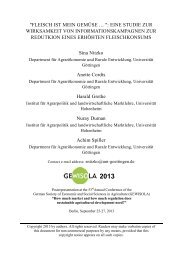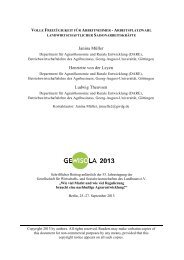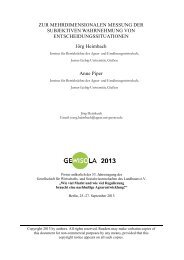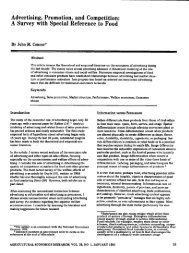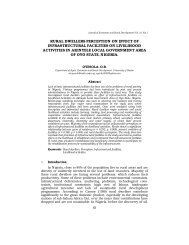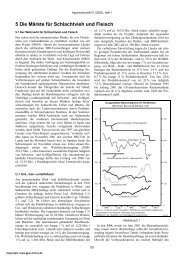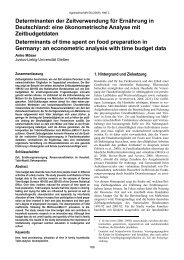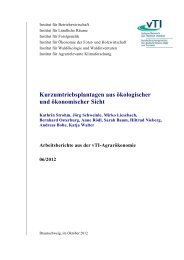District Institutes of Education and Training - Teacher Education
District Institutes of Education and Training - Teacher Education
District Institutes of Education and Training - Teacher Education
You also want an ePaper? Increase the reach of your titles
YUMPU automatically turns print PDFs into web optimized ePapers that Google loves.
<strong>District</strong> <strong>Institutes</strong> <strong>of</strong> <strong>Education</strong> <strong>and</strong> <strong>Training</strong>: A Comparative Study in Three Indian States<br />
had classroom management skills to try out suggested innovations in crowded<br />
schoolrooms – which were within their purview. While they acknowledged that<br />
their training programmes could have more impact, they did not cast themselves<br />
in proactive roles to address this issue. The list <strong>of</strong> concerns noted above came<br />
down to two key issues: the need to improve physical infrastructure was one, but<br />
the paramount ‘problem’ <strong>and</strong> root cause for the failure <strong>of</strong> their hard work to yield<br />
the expected results was teachers’ perceived unwillingness <strong>and</strong> lack <strong>of</strong> motivation<br />
to implement training. This was summarised by a staff member in Indore:<br />
By the time they receive training they develop a habit <strong>of</strong> teaching. After that it<br />
doesn’t matter how many trainings we give, they will do the same once they<br />
go back. We don’t have fundamental working conditions. We don’t have school,<br />
classroom, duster, blackboard, drinking water. Look here in this institute, there<br />
is so much noise here we want to talk but we can’t hear each other. In reality<br />
near schools, colleges <strong>and</strong> hospitals there shouldn’t be any noise. We are facing<br />
problems while talking. Until we have improved working conditions how can<br />
we improve all the things. There are so many other factors that our approach<br />
doesn’t work at all. The first thing is to improve this. We are doing what we can<br />
but we don’t have confidence after doing all the things. We also face the same<br />
problem, we are also not confident that the scheme we are giving will reach<br />
them, <strong>and</strong> from them, the students. For SSP all the staff are working so hard<br />
but the results it should give them are not coming. We also don’t underst<strong>and</strong><br />
why it’s not coming. The reason is the person who has to deliver it is not right<br />
[i.e. the teacher]. People who have been working for the last 20-25 years have<br />
their own methods <strong>and</strong> it’s very difficult to change them (MP/IND/TT 014<br />
4.2.99).<br />
These ‘commonsense’ reasons served as rationales to explain perceived low levels<br />
<strong>of</strong> implementation <strong>of</strong> training messages. In contrast with these perceptions was the<br />
view <strong>of</strong> the majority <strong>of</strong> Surat DIET staff that the DIET did have a role to play in<br />
addressing these concerns, along with other educational institutions in the <strong>District</strong>,<br />
<strong>and</strong> that the DIET was there to support teachers.<br />
3.8 Policy implications<br />
Appropriate staffing <strong>of</strong> DIETs has been compromised by recruitment policies that<br />
do not match individuals to job specifications. The double Master’s norm does not<br />
emerge as a crucial qualification for elementary teacher educators. This is to some<br />
extent recognised:<br />
It has to be acknowledged that M Ed provides only theoretical background <strong>and</strong><br />
orientation in some research techniques. It does not prepare teacher educators<br />
for educating teachers. It does not train trainers (NCTE 1998b: 53).<br />
DFID 69



